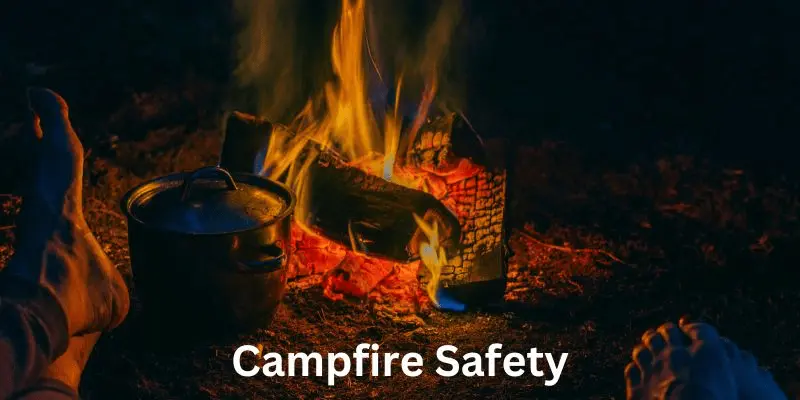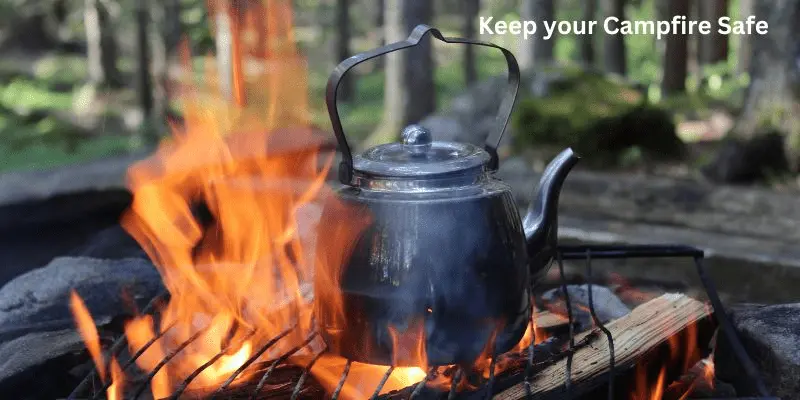The 7 Crucial Tips for Campfire Safety: Importance & Features
Updated: 23 Jan 2024
291
Campfire safety is super important when you’re out in nature. Imagine sitting around a fire with friends, telling stories, and enjoying the outdoors. That’s great, but it comes with a big responsibility. If we’re not careful, the fire can get out of control and turn into a dangerous wildfire. Campfire is the major portion of the camping.
So, to make sure everyone stays safe and to protect the environment, we need to follow some simple rules. Things like picking a good spot, keeping the fire small, and always having water nearby are crucial. Also, never leave the fire alone, and when it’s time to go, make sure to put it out completely. By being responsible around the campfire, we can enjoy its warmth and beauty while keeping ourselves and nature safe.
The Importance of Campfire Safety
Gathering around a campfire can be one of the most enchanting experiences when enjoying the great outdoors. It provides warmth, light, and a social hub for storytelling and friendship. For many campers and outdoor campers, a camping trip just isn’t complete without a crackling fire under the stars. However, with this beautiful tradition comes a great responsibility – the importance of campfire safety.
Campfires can quickly get out of control and turn into dangerous wildfires if not managed properly. It is crucial to take the necessary precautions to prevent accidents and protect the environment.

Tips for Keeping Your Campfire Safe
Here are 7 tips for keeping your campfire safe:
- Choose the right location: Before starting a fire, make sure you choose a safe and appropriate location. Clear the area of any dry leaves, branches, or debris that could catch fire easily. Avoid setting up your campfire near tents, trees, or anything else flammable.
- Use an existing fire ring: If you are camping in a designated campground, use the provided fire rings to contain your fire. These rings are usually made of stones or metal and help prevent the fire from spreading.
- Create a fire pit: If there is no existing fire ring, create your own by digging a small fire pit and surrounding it with rocks. This will also help contain the fire.
- Keep it small: A bigger fire may seem more appealing, but it is harder to control and can easily spread. Keep your fire small and manageable, no bigger than 3 feet in diameter.
- Always have water nearby: Make sure to keep a bucket of water or a hose nearby in case of emergencies. This will come in handy if the fire starts to spread or you need to put it out quickly.
- Never leave the fire unattended: It is essential to never leave your campfire unattended, even for a short period. Always make sure someone is responsible for watching the fire and can quickly tend to it if needed.
- Turn off the fire completely: When you are ready to call it a night or leave your campsite, make sure to turn off the fire completely. Pour water over the fire and stir it with a stick until there are no more embers or smoke. Feel the ashes with your hand to make sure they are cool to the touch before leaving.
Remember, even if you think you have put out the fire completely, it is always better to double-check and be extra cautious. Wildfires can start from a single spark, and it is our responsibility as campers to prevent them. Additionally, always check with the local authorities before starting a fire as there may be burn bans or other restrictions in place.
The importance of Campfire safety is crucial for every camper. By following these simple tips, you can enjoy the warmth and beauty of a campfire while also protecting yourself and the environment. Let’s all do our part to prevent wildfires and keep our campgrounds safe for future generations to enjoy. So gather around, roast some marshmallows, and make lasting memories – but always remember to be responsible and keep your campfire safe.
Features of Campfire Safety
Campfire safety mainly involves preventing wildfires from starting and spreading. This means taking measures to ensure that the fire is contained, under control, and properly turn off. Additionally, campfire safety also involves being prepared for any unforeseen circumstances and having a plan in place in case of an emergency.
Below are some features of campfire safety:
- Proper fire management: As discussed earlier, proper fire management involves choosing a safe location, using an existing fire ring or creating your own, keeping the fire small and manageable, and always having water nearby.
- Fire prevention: This includes being mindful of weather conditions and any burn bans or restrictions in place. It also involves properly disposing of ashes and making sure they are completely extinguished before leaving the campsite.
- Being prepared: It is crucial to always be prepared for emergencies by having a first aid kit and knowing what to do in case of a burn or wildfire. This includes having emergency contact numbers, understanding how to use a fire extinguisher, and knowing the nearest evacuation route.
- Responsible behavior: Campfire safety also requires responsible behavior from all campers. This includes never leaving the fire unattended, properly disposing of any flammable materials, and following all rules and regulations set by the campground or local authorities.
By holding to these features of campfire safety, we can ensure a safe and enjoyable camping experience for everyone. Remember, it only takes one careless act to cause a dangerous wildfire. Let’s all do our part in preventing them and keeping our campgrounds safe. Happy camping!

Selecting the Right Spot
Choosing the appropriate location for your campfire is the first step toward a safe and enjoyable experience.
Tent walls and flammable camping gear
- Overhanging branches
- Dry grass, leaves, and forest litter
- Steep slopes where hot embers could roll downhill
Opt for established fire pits if available, or create a bare patch of earth surrounded by a ring of stones to contain the fire.
Keeping the Campfire Manageable
A small fire is easier to control and just as effective at providing warmth and atmosphere.
To maintain a manageable campfire:
- Use smaller pieces of wood that fit within the confines of the fire pit
- Avoid piling on too much wood, which can create larger flames than necessary
- Always have water or a shovel handy to control the fire should it begin to spread
By keeping it small, you minimize the risk and ensure that your fire remains nothing more than an enjoyable part of your outdoor adventure.
Surveillance is Key
Never leave your campfire unattended, even for a short period. An unsupervised fire can quickly escalate into an uncontrollable blaze.
- Assign someone to watch the fire if you need to step away
- Ensure children and pets are supervised around the fire
- Keep flammable materials and excess fuel away from the fire’s perimeter
A watchful eye can mean the difference between a relaxing evening and a hazardous situation.
Turn of a Campfire Properly
When it’s time to retire for the night or leave the campsite, the proper turn of your campfire is very important.
- Drown the fire with water until all embers, not just the red ones, are out
- Stir the ashes with a shovel to uncover any remaining hot spots
- Feel the ashes with the back of your hand to ensure everything is cold to the touch
Leaving a fire that isn’t fully extinguished can lead to embers being carried by the wind and starting wildfires, which can have devastating consequences for miles around.
The Consequences of Negligence
A moment of carelessness can lead to common destruction. Not following campfire safety guidelines can result in:
- Uncontrolled forest fires that destroy habitats and endanger wildlife
- Damage to the surrounding eco-system, affecting vegetation and soil
- Personal liability for the cost of firefighting and damages
The stakes of campfire negligence are incredibly high, affecting not only your safety but also the well-being of the environment and the natural beauty we all enjoy.
you must consider the Additional Tips and Resources for enjoying your campfire while camping.
Pros and Cons of Campfire Safety
While campfire safety is essential to prevent accidents, some may argue that it takes away from the natural camping experience. However, the pros far outweigh the cons when it comes to holding campfire safety measures.
| Pros |
|---|
|
| Cons |
|---|
|
Ultimately, prioritizing campfire safety allows for a more enjoyable and responsible outdoor experience for all.
So next time you go camping, remember these guidelines and make sure to keep your fire contained, under control, and properly extinguished. After all, taking care of our environment and each other is the key to preserving the joy of camping for generations to come.
However, the journey towards a safer camping experience does not end here. It is important to continuously educate ourselves on new techniques and regulations for campfire safety to adapt and ensure enjoyable camping.
FAQs
Are campfires allowed in all camping areas?
No, it is important to check with the campground or local authorities before starting a fire. In some cases, campfires may be prohibited due to dry conditions or other safety concerns.
Can I use any type of wood for my campfire?
It is best to use dry, seasoned firewood for your campfire. Avoid using green or damp wood as it can create excess smoke and sparks.
Is it safe to cook food directly over a campfire?
Yes, but make sure to use proper cooking equipment and never leave the fire unattended while cooking. It is also important to properly extinguish the fire after cooking.
What should I do if I see an unattended campfire in a campground?
Immediately report it to the campground staff or local authorities. Do not attempt to put out the fire yourself, as it can be dangerous and is best left to trained professionals.
Can I have multiple fires at my campsite?
It is generally recommended to only have one fire at a time in order to prevent any accidents and minimize the impact on the environment. However, if you are camping with a large group, it is possible to have multiple smaller fires as long as they are properly managed and supervised.
How can I dispose of my campfire ashes?
Allow the ashes to cool completely before disposing of them. Once cooled, scatter the ashes in a wide and safe area away from any vegetation or flammable materials. Do not bury the ashes as they can still retain heat and start a fire. End of Document
Conclusion
Every camper and outdoor enthusiast must prioritize the importance of campfire safety. By being responsible and vigilant, you can ensure that your adventures in the wilderness remain safe and enjoyable for everyone. Remember, the best memories made around a campfire are those paired with the peace of mind that comes from knowing you are doing your part to protect the environment.
Please Write Your Comments